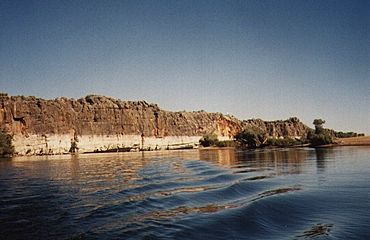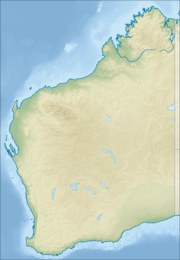Danggu Gorge National Park facts for kids
Quick facts for kids Danggu (Geikie) Gorge National ParkWestern Australia |
|
|---|---|
|
IUCN Category II (National Park)
|
|

Danggu Gorge
|
|
| Nearest town or city | Fitzroy Crossing |
| Established | 1967 |
| Area | 31.36 km2 (12.1 sq mi) |
| Managing authorities |
|
| Website | Danggu (Geikie) Gorge National Park |
| See also | List of protected areas of Western Australia |
Danggu (Geikie) Gorge National Park is a special place in the Kimberley region of Western Australia. It's about 1837 kilometers northeast of Perth and 420 kilometers east of Broome by road. This park is famous for its amazing gorge, carved by the Fitzroy River. It's a great spot to explore nature and see unique wildlife.
The gorge was first named Geikie Gorge in 1883. It was named after Sir Archibald Geikie, a British geologist. However, Sir Archibald never actually visited the gorge. The park is now officially changing its name to Danggu. This is the traditional name given by the Bunuba Aboriginal people, who are the traditional owners of this land. The park is also part of the larger Balili (Devonian Reef) Conservation Park.
Contents
Discover Danggu (Geikie) Gorge National Park
Danggu Gorge is one of the easiest parks to visit in the Kimberley region. It is only 20 kilometers from Fitzroy Crossing. A sealed road makes it simple to get there.
Visiting the Park
Visitors can only enter the park during the day. Camping is not allowed inside the park. You will find picnic shelters, barbecue areas, toilets, and water available for use.
Exploring the Gorge
There is a 3-kilometer walking trail along the western side of the gorge. The path can be rough, but it offers fantastic views. The eastern side of the gorge is a nature preserve and is closed to visitors.
You can also take a boat tour through the gorge. There is a boat ramp for public use, but its hours are limited. This helps avoid busy times when tours are running.
How the Gorge Was Formed
The mighty Fitzroy River created Danggu Gorge. During the wet season, the river can rise incredibly high. It can go up by as much as 16.5 meters! You can see the flood level clearly on the gorge walls. The rushing water has scoured the limestone white.
Ancient Reef History
The limestone walls of the gorge were once part of an ancient reef. This reef was not made by corals like today's reefs. Instead, it was formed by algae and other sea creatures that are now extinct. This happened during the Devonian period (a very long time ago!). The water was shallow then, allowing these organisms to build a reef up to 2 kilometers thick. Today, these reef remains stand as limestone ranges. They wind across the land, rising up to 100 meters above the plains. You can even find fossils from the Devonian period within the limestone layers.
Amazing Animals and Plants
The river water in the gorge supports a wide variety of life. You might spot barramundi fish, sawfish, and freshwater crocodiles living here.
Riverbank Life
Along the river banks, you'll find many different plants. These include river gums, freshwater mangroves, pandanus trees, cadjeput trees, and native figs. Thick banks of reeds also grow along the water's edge. This rich plant life provides a perfect home for many animals. Look out for fruit bats, lilac-crowned wrens, reed warblers, and the great bowerbird.
 | Jessica Watkins |
 | Robert Henry Lawrence Jr. |
 | Mae Jemison |
 | Sian Proctor |
 | Guion Bluford |


